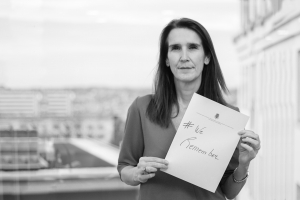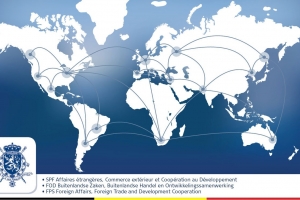Sophie Wilmès emphasizes continued Belgian commitment to children's rights on International Day against the Use of Child Soldiers
On the occasion of the International Day against the Use of Child Soldiers, Deputy Prime Minister and Minister of Foreign Affairs Sophie Wilmès reaffirms Belgium's commitment to improving the protection of children in armed conflict. The United Nations aims to improve the situation of these children by addressing the six most serious violations of children's rights: killing and maiming, sexual violence, abduction, attacks on schools or hospitals, denial of access to humanitarian aid and finally, the recruitment of child soldiers. Last year, the UN Secretary General reported no less than 25,000 gross violations of children's rights in some twenty countries. One in three of those violations is attributed to state actors.
Sophie Wilmès: "The brutality of armed conflict affects millions of children worldwide, and we note that the number of child rights violations in conflicts is increasing. As many as one in five children now suffers directly or indirectly from the effects of conflict. Children - the most vulnerable of all human beings - also suffer disproportionately from violence. It has a far-reaching impact on their physical and psychological well-being, as well as on longer-term sustainable peace and security. Unabated commitment from the international community is therefore a necessity."
The protection of children's rights has long been an important priority of Belgian foreign policy. During its mandate in the UN Security Council in 2019-2020, Belgium was given the chairmanship of the Working Group on Children and Armed Conflict.
Sophie Wilmès: “The fact that Belgium was awarded the Presidency of the Working Group on Children and Armed Conflict was the result of an active campaign by our country, but is also a sign that our expertise and credibility are widely recognized. Our country has used the presidency to bring the issue of children in armed conflict to the forefront of the Security Council's agenda."
Under Belgium's leadership, the UN Security Council adopted unanimous recommendations on conflicts in thirteen countries over the past two years. Even in complex dossiers such as Syria, Yemen and Myanmar, our country succeeded in uniting the Security Council around qualitative recommendations. Including stronger references to child detention, respect for the Convention on the Rights of the Child, the Safe Schools Declaration and the International Criminal Court, the Security Council's recommendations were given stronger language than in the past.
Belgium also ensured that the Security Council adopted two presidential statements on the subject: one on representing the interests of children in peace processes and the other on attacks against schools, a particularly important phenomenon in the Sahel and in the Lake Chad region.
The challenge now is to mainstream elements of this working group's conclusions throughout the UN agenda and work with them on the ground. Beyond the UN Security Council, Belgium is also engaged on various fronts in the fight against violations of children's rights. For example, our country makes a significant financial contribution to the "monitoring and reporting mechanism" (MRM) of UNICEF that collects information on this subject. Highlighting child rights violations and exposing and holding perpetrators accountable are crucial steps in tackling the problem. Belgium is also focusing on the issue of children and armed conflict within the EU and NATO.
Belgium is also dealing with children of Belgian Foreign Terrorist Fighters in conflict situations, especially in Syria. This makes the issue of protecting children in armed conflict very concrete for our country. Those children are victims. Our country has repatriated several Belgian children in recent years.
As a party to the UN Convention on the Rights of the Child and the three Optional Protocols to this Convention, Belgium is not only working for universal ratification of the Convention, but also for its global implementation. Especially in the context of the COVID-19 pandemic, children deserve extra attention and resources to minimize the negative impact of the pandemic on their situation. As a result of rising poverty and declining household incomes, not only are the right to education and the right to food threatened, there is also a real risk that more children will be forced into child labor.
The promotion of children's rights will remain a major focus of attention for Belgium in the future. Our country will continue to actively work for children's rights and better protection of children in armed conflict.


